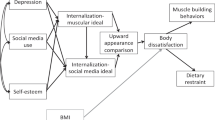Abstract
OBJECTIVE: The main purpose of this study is to evaluate the different aspects of the construct of alexithymia in a group of severe obese patients not affected by eating disorders. Moreover, we tested if in the same patients there was a relationship between alexithymic traits and depressive symptoms. METHOD: Forty-nine severe obese patients were evaluated through the Toronto Alexithymia Scale (TAS-20) and the Beck Depression Inventory (BDI). The results were compared with those of a normal weight control group. RESULTS: Obese patients were less able than control subjects in recognizing and labeling their own emotions. This deficit was positively associated with depressive symptoms. CONCLUSIONS: The data suggest that severe obese patients have more difficulties in recognizing their emotions and have more depressive symptoms than control subjects have.
Similar content being viewed by others
References
Adami GF, Campostano A, Ravera G, et al. Alexithymia and body weight in obese patients. Behav Med 2001; 27: 121–6.
Roberts RE, Deleger S, Strawbridge WJ, et al. Prospective association between obesity and depression: evidence from the Alameda county study, Int J Obes Relat Metab Disord 2003; 27: 514–21.
Sullivan M, Karlsson J, Sjostrom L, et al. Swedish obese subjects (SOS): an intervention study of obesity: baseline evaluation of health and psychosocial functioning in the first 1,743 subjects examined. Int J Obes 1993; 17: 503–12.
Sifneos PE. The prevalence of ‘alexithymicf’ characteristics in psychosomatic patients. Psychother Psychosom 1973; 22: 255–62.
Taylor GM, Bagby RM, Parker JDA. The alexithymia construct: A potential paradigm for psychosomatic medicine. Psychosomatics 1991; 32: 153–64.
Schmidt U, Jiwany A, Treasure J. A controlled study of alexithymia in eating disorders. Comprehensive Psychiatry 1993; 34: 54–8.
Kessler H, Schwarze M, Filipic S, et al. Alexithymia and facial emotion recognition in patients with Eating Disorders. Int J Eat Disord 2006; 39: 245–51.
De Zwaan M, Bach M, Mitchell JE, et al. Alexithymia, obesity and binge eating disorder. Int J Eat Disord 1995; 17: 135–40.
Carano A, De Berardis D, Gambi F, et al. Alexithymia and body image in adult outpatients with binge eating disorder. Int J Eat Disord 2006; 39: 332–40.
Clerici M, Albonetti S, Papa R, et al. Alexithymia and obesity. Study of the impaired function by the Rorschach test. Psychother Psychosom 1992; 57: 83–93.
Sexton MC, Sunday S, Hurt S, et al. The relationship between alexithymia, depression and axis II Psychopathology in eating disorder inpatients. Int J Eat Disord 1998; 23: 277–86.
Bagby RM, Parker JDA, Taylor GJ. The Twenty-Item Toronto Alexithymia Scale-I. Item selection and crossvalidation of the factor structure. J Psychosom Res 1994; 38: 23–32.
Calcagno P, Nobili M, Pecori L, et al. Alessitimia nei pazienti obesi e nei soggetti post-obesi dopo chirurgia bariatrica. Psicoterapia Cognitiva e Comportamentale 2006; 12: 145–59.
Marechal V, Loas G, Legrand A, Corcos M. Alexithymia in severely obese patients seeking surgical treatment. Psychol Rep 2009; 105: 935–44.
Surcinelli P, Baldaro B, Balsamo A, et al. Emotion recognition and expression in young obese participants: preliminary study. Percept Motor Skills 2007; 105: 477–82.
Lane RD, Quinlan DM, Schwartz GE, et al. The levels of Emotional Awareness Scale: a cognitive-developmental measure of emotion. J Pers Assess 1990; 55: 124–34.
Morosin A, Riva G. Alexithymia in a clinical sample of obese women. Psychol Rep 1997; 80: 387–94.
Pinaquy S, Chabrol H, Simon C, et al. Emotional eating, alexithymia, and binge-eating disorder in obese women. Obes Res 2003; 11: 195–201.
Vinai P, Todisco P. Quando le emozioni diventano cibo, psicoterapia cognitiva del Binge Eating Disorder. Milano, Edizioni Libreria Cortina, 2007.
Faith MS, Matz PE, Jorge MA. Obesity-depression associations in the population. J Psychosom Res 2002; 53: 935–42.
Friedman MA, Brownell KD. Psychological correlates of obesity: moving to the next research generation. Psychol Bull 1995; 117: 3–20.
Fitzgibbon ML, Stolley MR, Kirschenbaum DS. Obese people who seek treatment have different characteristics than those who do not seek treatment. Health Psychol 1993; 12: 342–5.
Krukowski RA, Friedman KE, Applegate KL. The utility of the Beck Depression Inventory in a bariatric surgery population. Obes Surg 2010; 20: 426–31.
Ross CE. Overweight and depression. J Health Soc Behav 1994; 35: 63–79.
Blaine B. Does depression cause obesity? A metaanalysis of longitudinal studies of depression and weight control. J Health Psychol 2008; 13: 1190–7.
Fairburn CG, Cooper Z. The eating disorder examination. In: Fairburn CG, Wilson GT (Eds) Binge Eating: Nature, Assessment and Treatment, 12th ed. New York, Guilford Press, 1993, pp 317–60.
Derogatis LR, Lipman RS, Covi L. The SCL-90: An outpatient psychiatric rating scale — Preliminary report. Psychopharmacol Bull 1973; 9: 13–28.
Beck AT, Ward C, Mendelson M. Beck Depression Inventory. Arch Gen Psychiatry 1961; 4: 561–71.
Fukunishi I, Kaji N. Externally oriented thinking of obese men and women. Psychol Rep 1997; 80: 219–24.
Elfhag K, Lundh LG. TAS-20 alexithymia in obesity, and its links to personality. Scand J Psychol 2007; 48: 391–8.
Celikel FC, Kose S, Erkorkmaz U, et al. Alexithymia and temperament and character model of personality in patients with major depressive disorder. Compr Psychiatry 2010; 51: 64–70.
Costa A, Peppe A, Carlesimo GA, et al. Alexithymia in Parkinson’s disease is related to severity of depressive symptoms. Eur J Neurol 2006; 13: 836–41.
Wheeler K, Greiner P, Boulton M. Exploring alexithymia, depression, and binge eating in self-reported eating disorders in women. Perspect Psychiatric Care 2005; 41: 114–23.
Author information
Authors and Affiliations
Corresponding author
Rights and permissions
About this article
Cite this article
Da Ros, A., Vinai, P., Gentile, N. et al. Evaluation of alexithymia and depression in severe obese patients not affected by eating disorders. Eat Weight Disord 16, 24–29 (2011). https://doi.org/10.1007/BF03327517
Received:
Accepted:
Published:
Issue Date:
DOI: https://doi.org/10.1007/BF03327517




